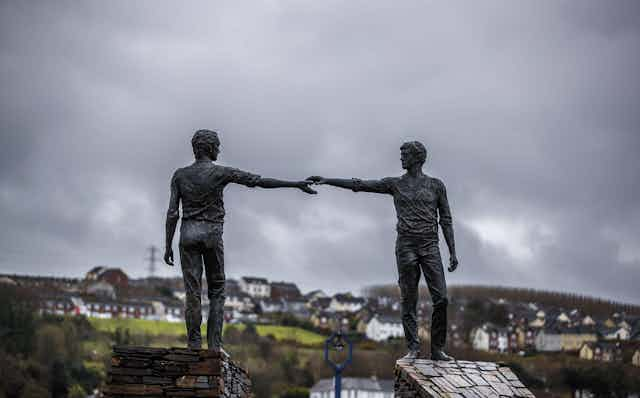Amid the death and suffering unleashed by Israel’s war on Gaza and the Hamas attack on Israel on October 7, prospects for lasting peace between Israelis and Palestinians appear ever more elusive. But when the war eventually ends, pressure will mount for negotiations to begin for a deal. When that day comes, how can opposing sides in such an intractable conflict find enough common ground to reach an agreement?
In this episode of The Conversation Weekly podcast, we hear about a method called peace polling, tried out successfully in Northern Ireland, that could offer a blueprint for how to reach a settlement in the Israeli-Palestinian conflict.
After living through decades of violence, in May 1998 the people of Northern Ireland were asked to vote in a referendum on a peace deal, known as the Good Friday Agreement. The referendum passed with a 71% majority.
Colin Irwin was not surprised. He’d been part of a team working for months alongside the formal negotiations on a series of public opinion polls in Northern Ireland. The questions were agreed with all the political parties involved in the negotiations, including some of those linked to the worst of the violence during Northern Ireland’s Troubles. Irwin says the most important poll he did was the one just before a deal was reached.
We had a precis of the agreement and we asked people if they would accept it. Within one percentage point, we were accurate to what the final referendum was, by which time the parties knew that our polls were very accurate … They then knew that they wouldn’t be committing political suicide by signing up to the deal.
Today, Irwin is a research fellow at the University of Liverpool in the UK. He’s worked to bring the method of peace polling developed in Northern Ireland to inform peace negotiations in a variety of conflicts around the world, from Syria to the Balkans and Sri Lanka.
Peace polling can work in any context and we can always find out what people can accept. My personal view is that it always should be done in every conflict all the time so the world should know what the deal is and what can be accepted.
In early 2009, Irwin conducted a peace poll in Israel and Palestine, meeting with political parties from all sides in the conflict, including Hamas. The only person who wouldn’t meet him, he says, was Benjamin Netanyahu. And he argues that since then, Israel has failed to learn the lessons from the Northern Ireland peace process.
Listen to The Conversation Weekly podcast to hear Colin Irwin explain about how the Inuit helped inform the design of peace polling, and more about his work in Northern Ireland and Israel-Palestine. The episode also includes an interview with Jonathan Este, senior international editor at The Conversation in the UK.
A transcript of this episode is now available.
This episode of The Conversation Weekly was written and produced by Gemma Ware and Mend Mariwany, with assistance from Katie Flood. Sound design was by Eloise Stevens, and our theme music is by Neeta Sarl. Stephen Khan is our global executive editor, Alice Mason runs our social media and Soraya Nandy does our transcripts.
You can find us on X, formerly known as Twitter @TC_Audio, on Instagram at theconversationdotcom or via email. You can also subscribe to The Conversation’s free daily email here.
Listen to The Conversation Weekly via any of the apps listed above, download it directly via our RSS feed or find out how else to listen here.

